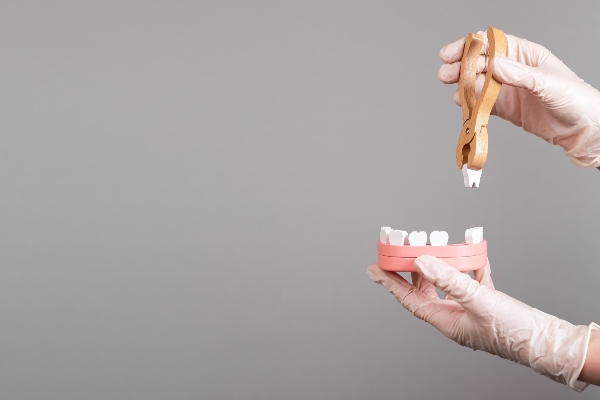Many situations require dental extractions. Removing the problematic tooth can improve your dental health. It can even prevent further complications.
The importance of tooth extractions
If patients want to know the importance of dental extractions during an emergency dental treatment, here are the details.
For a dental fracture that went beyond the gums
A dental fracture can happen if the patient bites down hard enough to crack the lower molars. This is more likely to happen if they have had a recent large filling or a root canal. The fracture will cause intense pain. The emergency dentistry professional will need to extract the tooth at this point. There will be pain relief as soon as the dentist removes the damaged tooth.
For an impacted wisdom tooth
Wisdom teeth are also known as third molars. They are the last teeth to erupt from a person’s gumline. They can emerge during the late teens or early adulthood. Some people have healthy wisdom teeth that fully erupt and align with the neighboring teeth. Other people have wisdom teeth that develop and stay underneath the gumline.
These impacted teeth can be incredibly painful. An impacted tooth puts pressure on the neighboring teeth because it does not have enough room to erupt. The developed teeth underneath the gums are also still prone to decay or infection. That is why an emergency dentistry provider will recommend dental extraction. This procedure will relieve the pressure and pain.
For gum disease
Periodontal disease happens when gingivitis is not caught early and treated. This severe infection deteriorates the gums and supporting soft tissue structures. The deterioration causes the gums to recede. Eventually, the tooth will need an extraction or simply fall out on its own. An emergency dentistry professional will extract the tooth if it is necessary to do so. This will relieve the pain and stop the spread of infection.
For severe dental decay
This condition occurs if there is untreated plaque and tartar. The emergency dentistry provider can maintain the tooth with the help of restorative methods. These will work if there is still a healthy dental structure. But if the tooth’s decay is beyond the help of a root canal, filling, or crown, a dental extraction will be necessary. It will also prevent the decay from spreading.
What happens during a tooth extraction
The emergency dentistry provider will numb the affected tooth and its surrounding tissue. After a few minutes, the patient will not feel any pain in the area. They will only feel pressure on the tooth. The dentist will loosen the tooth and then, using forceps, pull out the tooth. The site might be stitched up with self-dissolving stitches afterward.
The patient will need to bite down on sterile gauze after the dental extraction. This will help stop the bleeding. The pressure will help the blood clot. This clot will then cover the bone in the dental socket. The dentist will provide aftercare instructions before the patient goes home.
Emergency dentistry can help improve your dental health through dental extractions
Natural teeth are important to one’s general health. It is why dentists want their patients to have their natural teeth for as long as possible. But if the situation calls for a tooth extraction, the emergency dentistry professional will take care of it. Working with your dentist can make your recovery quick and improve your dental health.
or call Hal M. Hirsch DMD, FAGD at 856-270-6447 for an appointment in our Laurel Springs office.
Related Posts
A tooth abscess is an infection that begins in the mouth and can spread to other body regions. Gum disease and tooth decay are often the outsets of a spot. A tooth abscess is much more likely in those with poor oral hygiene habits. Anyone experiencing the condition should visit the emergency dentistry office as…
An emergency dentistry facility can treat mouth injuries right away. The treatments aim to reduce discomfort and prevent any lasting complications. Many different dental traumas happen to people every day. Learn how a trained dentist can help, so you can become more determined to look for the nearest facility in your area.Here are the details…
Emergency dentistry deals with dental emergencies that require immediate treatment. For example, an infected tooth requires urgent care since it causes excruciating pain, and the infection is always a risk of expanding to other parts of the body.Here are some fascinating facts everyone should know about emergency dentistry:The emergency dental care umbrella covers any dental…
